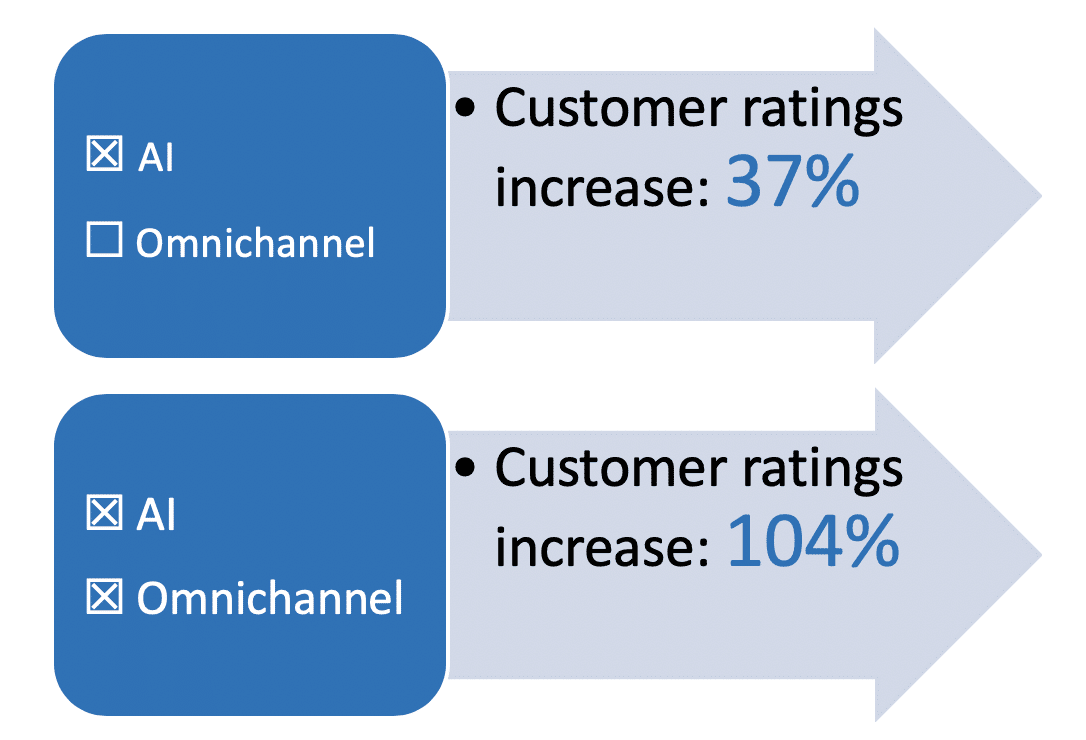
The attraction of these messaging apps is clear: they offer customers the convenience of having conversations with brands as casually and effortlessly as they would with a friend. Asynchronous conversations make it possible to continue interactions over hours and even days. Users can drop a conversation in January and effortlessly pick up where they left off in February.
But while the choice to support additional digital channels might seem simple, adding any new messaging channel, especially ones that promote conversational interactions, will generate an influx of new communications.

Listen to this webinar with Robin Gareiss from Nemertes Research, or read on to learn more about how artificial intelligence can power a new age of customer engagement and deliver better experiences to increase your contact center efficiency, results, and even turn it into a profit center.
3 ways to use AI to power intelligent customer engagements:
1. Drive customers to self-service
No one has the time or patience to wait on the phone for a live agent, listening to bad hold music, just to solve a basic problem. Chatbots and virtual assistants were designed to simulate human interactions and provide immediate answers to customer inquiries at any time to reduce operational costs and eliminate frustrating delays and errors in customer service.
Aided by intelligent software, bots will know when to escalate issues, how to classify content, and how to route requests to the right people. Here are some examples of successful applications of AI in self-service:
- When a customer asks a question, the chatbot guides the user to a self-service knowledge base
- When in a self-service knowledge base, bots can track dispositions, watching for signs of frustration and escalate
With some technical support, businesses can quickly develop powerful chatbots to handle frontline communications, freeing up human agents to work on more difficult or nuanced cases.
2. Develop a 360* view of the customer
Large amounts of transactional, conversational, and personal data are generated from within a business’s application ecosystem. Artificial intelligence tools can extract and collate large amounts of customer information from various sources, and generate valuable insights which improve agent productivity, and decrease operating costs.
Here are some examples of successful applications of AI in personalizing the customer experience:
- Map inquiries from multiple customer profiles to a single user identity that groups requests on a single ticket.
- Predict what the customer wants, and make sure the products are available in inventory before pushing the recommendation.
- Push product recommendations based on your history.
By delivering the right message at the right time to a customer’s preferred device, you can make customers feel as if the experience was tailored just for them.
3. Implement technology to revamp the agent experience
Being an agent is difficult. Turnover rates are high due to low pay, minimal coaching, and lack of tools required to succeed. All of this causes customers to become frustrated with the agents, which in turn makes them unhappy at their jobs.
It’s important to have a plan to revamp the agent experience to reduce agent turnover, improve customer satisfaction, and reduce operational costs. One of the easier ways to do this is to provide agents with tools that allow them to service the customer more intelligently.
Here are some examples of successful applications of AI in improving the agent experience:
- Intelligent routing with real-time voice transcription and language translations
- Sentiment and predictive behavioral analysis
- Screen-pops with contextual and historical customer information
The challenge of improving your customer care strategy begins by empowering agents with the tools and solutions required to solve customer issues quickly and effectively. A cornerstone to achieving that goal is developing a more intelligent engagement model, aided in large part by artificial intelligence (AI) and its derivatives.
Many businesses today haven’t adapted their customer service strategies to adjust to new digital trends and preferences of customers. Instead, they’re still leading customers down the same old, outdated, difficult-to-use engagement path.
For more detail on how to use AI to power intelligent customer engagement, listen to this webinar with Robin Gareiss from Nemertes Research.
Originally published Oct 24, 2019, updated May 22, 2024




